Almost 1,000 “gotaway” migrants illegally entered the United States through the southern border on Sunday, marking a surge in unauthorized crossings. These individuals, who are not recorded in official border statistics, are intercepted and tracked by Customs and Border Protection (CBP) internally. The recent influx brings the 7-day average of “gotaways” at the southern border to 761 per day, demonstrating the ongoing challenges faced by border enforcement agencies. Additionally, recent incidents such as the arrest of four migrants cutting wire over a border fence highlight the complex and multifaceted nature of illegal border crossings.
Apart from the Southwestern United States, the impact of the migrant influx is being felt in various states across the country. In Denver, city official Andres Carrera was captured on film advising migrants to seek opportunities in other cities like New York and Chicago due to limited resources in their current location. This relocation suggestion underscores the strain on local resources and the need for coordinated responses to address the needs of both migrants and host communities. Additionally, Boston officials have resorted to placing migrants in veterans’ housing, further highlighting the challenges posed by the growing number of arrivals and the strain on existing services and infrastructure.
Recent polling data suggests that illegal immigration remains a major concern for many Americans, with 48% of participants expressing worry over the issue in a recent Gallup poll. Of note is the increase in concern among Democrats, rising from 14% to 27%, indicating a growing recognition of the complexities surrounding immigration policy and enforcement. Furthermore, a separate Associated Press poll found that there is bipartisan support for increasing the number of border patrol agents, with 79% of Republicans, 54% of Democrats, and 56% of independents in favor of bolstering border security measures. These findings underscore the importance of addressing border enforcement and immigration policy in a manner that garners broad-based support and cooperation.
The recent surge in unauthorized border crossings underscores the ongoing challenges faced by enforcement agencies and highlights the need for comprehensive and coordinated responses to address the complex dynamics of migration flows. With almost 1,000 “gotaway” migrants entering the country on a single day, the strain on resources and infrastructure is becoming increasingly apparent. The relocation of migrants to other cities and the use of veterans’ housing in Boston illustrate the need for innovative solutions to manage the growing number of arrivals and alleviate pressure on local communities.
In response to the escalating situation at the border, officials are grappling with the need to balance enforcement measures with humanitarian considerations. By addressing the underlying factors driving migration and enhancing cooperation with countries of origin, destination, and transit, policymakers can work towards sustainable solutions that promote safe and legal pathways for migrants while upholding the rule of law. Additionally, continued engagement with local communities and stakeholders is essential to ensure that the needs of both migrants and host populations are effectively addressed, fostering a more inclusive and humane approach to immigration management.
As the Biden administration grapples with the complex challenges posed by illegal immigration, recent polling data underscores the importance of bipartisan support for efforts to secure the border and address the root causes of unauthorized migration. With concerns about illegal immigration on the rise, there is a growing recognition of the need for effective border enforcement and immigration policies that prioritize the security and well-being of both migrants and host communities. By embracing a balanced and comprehensive approach to migration management, policymakers can work towards addressing the underlying drivers of migration, enhancing border security, and fostering greater cooperation and understanding among all stakeholders involved in the immigration debate.













